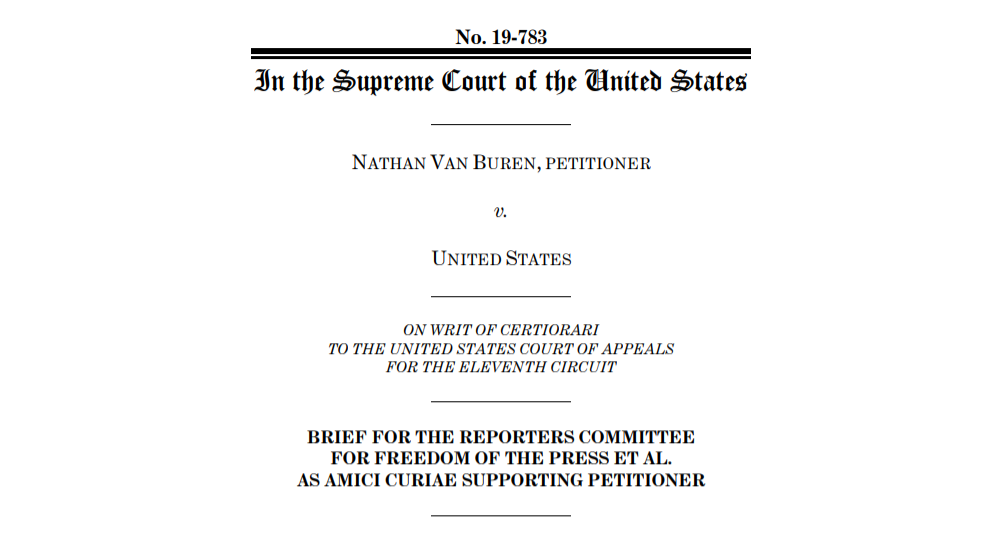Media coalition urges Supreme Court to narrow scope of federal hacking law to protect newsgathering

The Reporters Committee, joined by 41 news organizations, urged the U.S. Supreme Court on Wednesday to reject a lower court’s broad interpretation of a federal hacking law, arguing that it could significantly chill traditional newsgathering and data journalism.
The case, Van Buren v. United States, marks the first time the Supreme Court has agreed to consider the scope of the Computer Fraud and Abuse Act, or CFAA, the federal computer crime statute.
In a friend-of-the-court brief, the media coalition argues that the U.S. Court of Appeals for the Eleventh Circuit’s interpretation of a particular section of the law could dissuade sources from coming forward, and could potentially lead to conspiracy charges against reporters themselves, depending on how they interact with sources. It further notes that the decision below could criminalize online newsgathering that, if done in the analog world, would be fully protected by the First Amendment.
The case arose when Nathan Van Buren, a police officer in Cummings, Georgia, was prosecuted under the CFAA for using a government license-plate database to access information allegedly for financial gain. In its October 2019 ruling on the case, the Eleventh Circuit concluded that Van Buren “exceed[ed] authorized access” and therefore violated the CFAA when he accessed the database. While he had credentials to access the database for professional purposes, the court agreed that the CFAA could be construed to cover anyone who uses a computer system for an improper purpose.
In his appeal to the Supreme Court, Van Buren argues that the Eleventh Circuit’s interpretation of the relevant section of the CFAA is unconstitutional. Section 1030(a)(2) of the CFAA states that “[w]hoever intentionally accesses a computer without authorization or exceeds authorized access, and thereby obtains … information from any protected computer” has committed a federal crime. (Virtually all computers connected to the internet — that is, virtually all computers — are “protected.”)
The Reporters Committee’s friend-of-the-court brief argues that the Eleventh Circuit’s broad interpretation of Section 1030(a)(2), which has also been adopted by the First, Fifth, and Seventh Circuits, criminalizes an extremely wide range of conduct, is unconstitutionally vague, and would chill First Amendment freedoms.
Further, the broad interpretation in those jurisdictions has been rejected in the Second, Fourth, and Ninth Circuits, in a more recent line of cases. Those courts define “exceeds authorized access” under the CFAA as accessing information that one does not have authorization to “obtain or alter” at all. (In other words, those courts reject an “improper purpose” theory.) The media coalition’s brief argues that the Supreme Court should adopt the narrow approach to the law and reject the Eleventh Circuit’s interpretation.
The brief argues that an expansive reading of the CFAA violates “vagueness doctrine,” which means a law that is “so vague that it fails to give ordinary people fair notice of the conduct it punishes, or so standardless that it invites arbitrary enforcement.” The brief also argues that the broad construction of the law effectively allows private parties that administer or own a computer system to decide when it is violated, which raises similar concerns (particularly given that terms of use are often written broadly and change frequently).
As noted, the broad interpretation could be harmful to traditional journalistic practices. Journalists have long relied on their relationships with government sources and whistleblowers in order to obtain important information. However, as stated in the brief, “Because a violation of an employer’s computer-use policy constitutes a crime under [the Eleventh Circuit’s] interpretation and such a violation would occur virtually any time a potential source were to use a work computer to access information for a non-business reason — i.e., any time a source is acting as a source — such an interpretation would strongly deter potential sources from coming forward with newsworthy information.” Additionally, journalists who work with sources could face prosecution for violating the CFAA under a conspiracy theory.
The Eleventh Circuit’s approach would likewise be detrimental to the growing field of data journalism. Data journalists often engage in a process called web-scraping, a technique that pulls large amounts of information from websites. The investigative reports made possible by web-scraping reveal valuable information and serve an important public interest. For example, through web-scraping, journalists have unveiled conditions in Chicago’s prisons, identified doctors that have continued to practice after being caught sexually abusing patients, and exposed the unlawful discriminatory practices of companies like the Princeton Review and Airbnb.
These journalistic practices — which could be unlawful were the Supreme Court to uphold the Eleventh Circuit’s interpretation of the CFAA — continue to play an important role in uncovering valuable information and reporting in the public interest.
The Reporters Committee was represented in the matter by Paul, Weiss, Rifkind, Wharton & Garrison LLP. Kannon Shanmugam, chair of the Supreme Court and Appellate Practice Group and managing partner of the firm’s Washington, D.C., office, served as counsel of record. He was joined on the brief by Joel Johnson and Amanda Weingarten.
Read the media coalition’s full brief.
The Reporters Committee regularly files friend-of-the-court briefs and its attorneys represent journalists and news organizations pro bono in court cases that involve First Amendment freedoms, the newsgathering rights of journalists and access to public information. Stay up-to-date on our work by signing up for our monthly newsletter and following us on Twitter or Instagram.